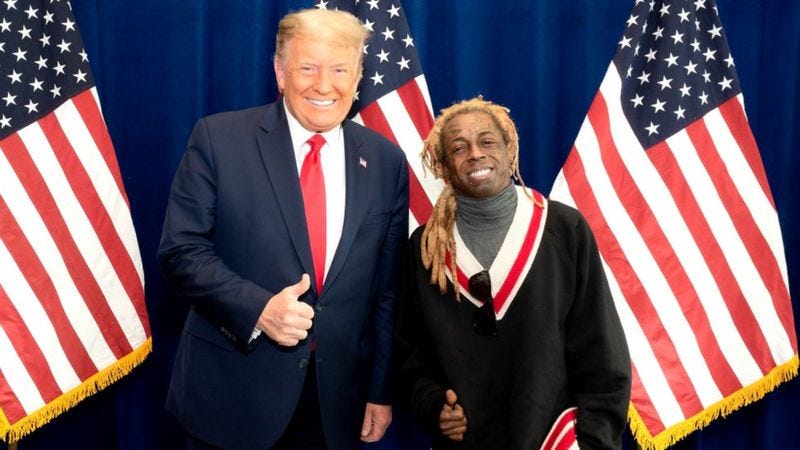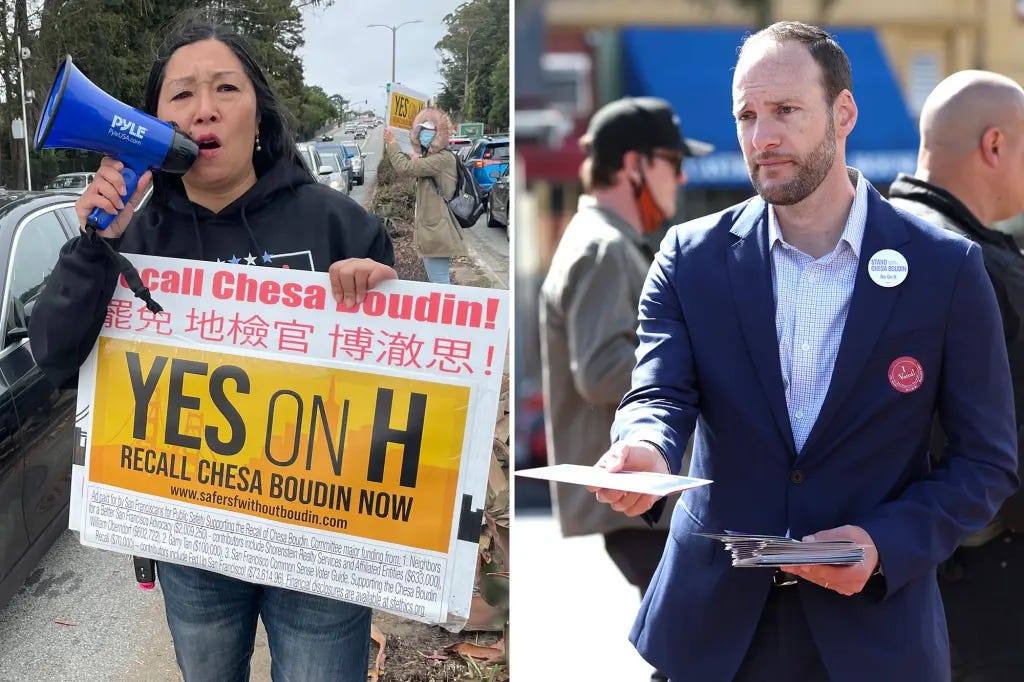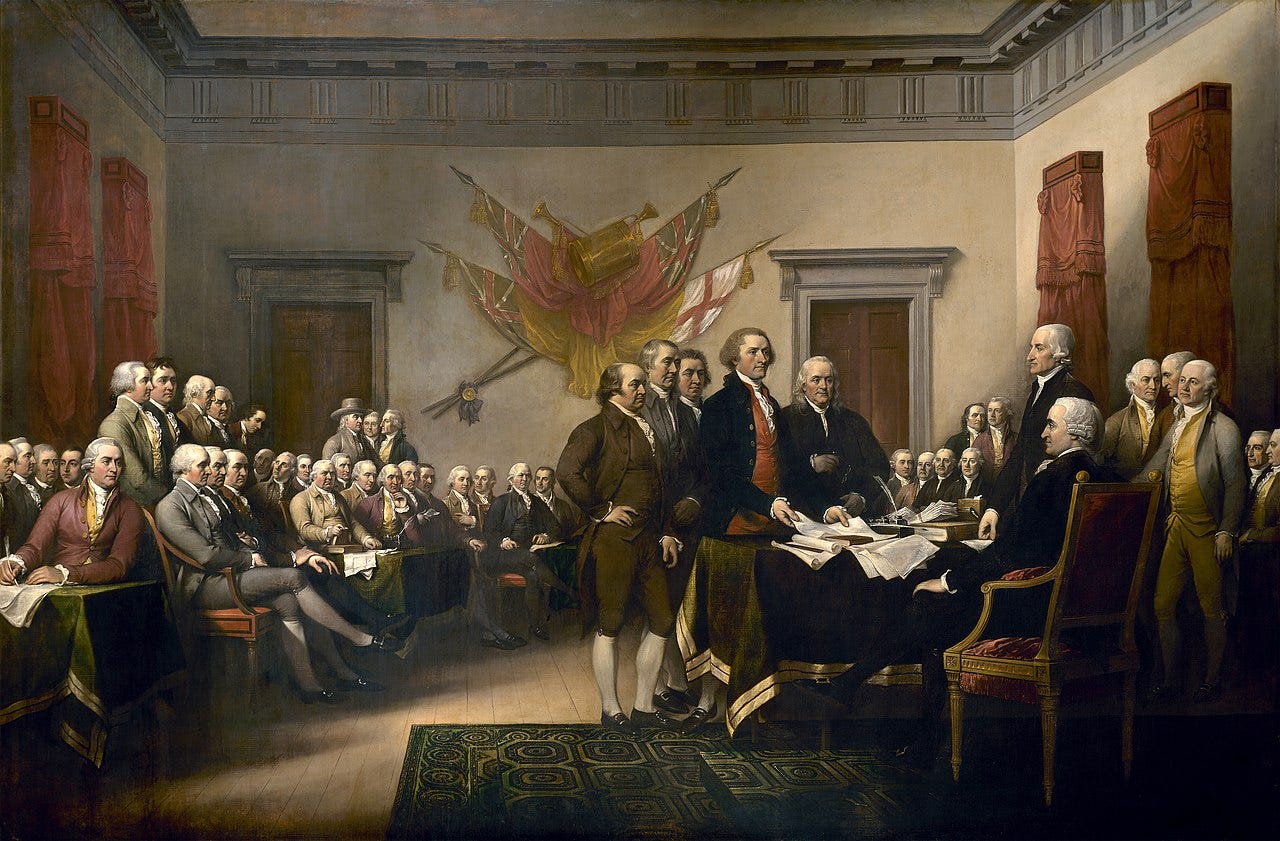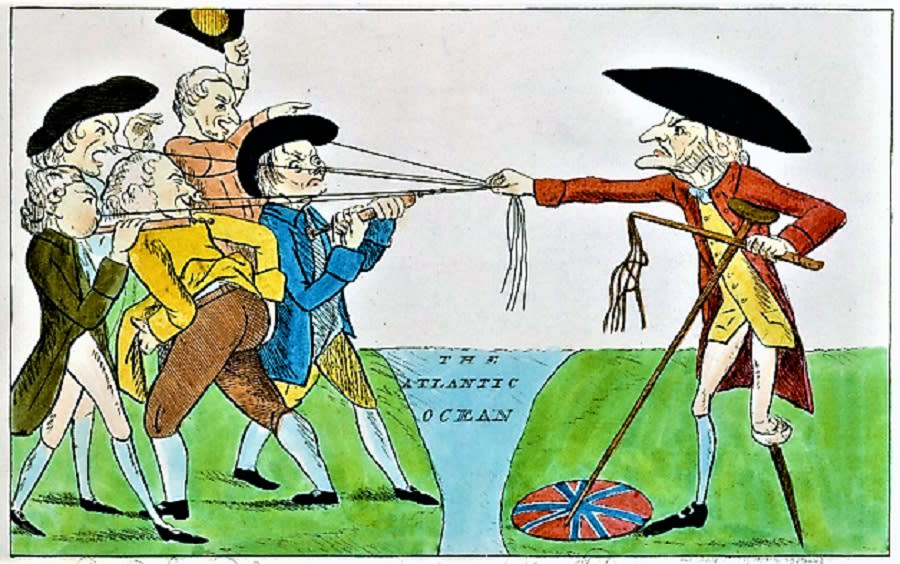Post-Post-American identity
Huh?
As the living situation in the US visibly declines and prominent American institutions fall one by one to the forces of social revolution and dysfunction, many people are asking “What’s next?” The Trump movement injected enormous energy into the dying post-Bush conservative scene. What had been unthinkable became not just thought, but articulated in public policy. And yet, despite all this new energy, Trump is not President anymore. In fact, he and his supporters are beset by legal problems and political persecution. Did he fail? Is America cooked? Is it time to pack up and move on to something new?
“What’s next?” is a bit of a loaded question. It presumes first that the Trump movement is cooked, and second that there is anything after Trump for American conservatives to move on to. The first point remains to be seen. Although everyone can be certain that whatever trials await Trump and his supporters will be kangaroo courts, crude mockeries of justice conducted by activists, clowns, and half-wits, there is still the possibility that in higher courts cooler heads will prevail and the bogus charges will be tossed out.
The second question has a more clear answer: No. There is nothing after Trump. The Trump movement was a return to conservative politics of the grand old style. Trump’s muscular campaign and political program (to the extent he was able to implement it), recalled the heroes of a largely forgotten period of American politics. “America First” was also the campaign slogan of President McKinley, who fought corruption before creating unparalleled prosperity for regular Americans and huge territorial expansion. This is what conservative policy was supposed to be all along. It is senseless to try and deviate from this political program, which is the most popular in modern history.
Suggestions for what to move on to leave much to be desired. Some have argued for dropping the most controversial aspects (namely opposition to mass immigration) of the Trump platform in attempt to create a broader “new base” to build a future political movement from. Some have even claimed that by this point the “American people” do not even exist anymore, so it is pointless to pursue controversial policies which alienate new arrivals in the name of preserving this group’s integrity.
These suggestions are based off many flawed assumptions. The first is that creating a new base is desirable or even possible. America largely votes along demographic lines. To cut through the niceties, there is a politically divided majority white population that leans Republican, paired with a smaller nonwhite population that leans Democrat to a much greater degree. When whites turn out to vote in national elections at higher than expected rates, Republicans win. When they do not, Republicans lose. Attempting to adjust the Republican platform to turn-out nonwhite voters for Republicans might come at the cost of white turnout.
For instance, Black Lives Matter movement is still overwhelmingly supported by black Americans, and its agenda means bad things for everyone else: dramatic increases in crime, graft, and social unrest. Even though at the individual level many black people may oppose some of these policies, especially as their impact on quality of life is more and more negative, this has produced virtually no change.
Although there were many factors contributing to Republicans’ loss in 2020, ill-advised attempts to pander to the black community by adopting parts of the BLM agenda saw no substantive shift in black voting habits and lower than expected white turnout in rural and suburban areas.
Another good example of this can be found in San Francisco’s recall election. In 2019 San Francisco elected a radical leftist District Attorney, Chesa Boudin, a public defender who is the son of Weather Underground terrorists. He refused to perform his duties, allowing criminals free reign in the city. All public spaces were soon affected by crime and disorder. The city was a disaster. A recall effort began to remove Boudin, spearheaded by Chinese and other minority residents of the city.
Conservatives, eager to expand their base outside of the white majority, celebrated this. They noted that whites in San Francisco (a group that’s likely pretty distinct from American whites in general) voted to keep Boudin at far greater rates than nonwhite residents. Thanks to enormous amounts of hard work from the recall campaigners, the vote was successful. Boudin was recalled and replaced by a supposedly tough on crime female black prosecutor.
This victory was followed by no real change in policy. The Bay Area is still beset by huge levels of violence and disorder. Criminals are still given lenient treatment, if they are pursued at all. In fact, crime appears to have increased (though this could just be the result of more accurate reporting, Boudin’s staff was heavily manipulating crime statistics). There is simply not the political will, at a large scale, across these communities to substantively deviate from the Democratic platform. Even when individuals can recognize the problems, solutions are off limits at the group level.
Republicans would likely do better with minorities if, rather than moderating their message, they embraced the policies that their current base demands. Hostility to the Black Lives Matter movement probably contributed to unprecedented numbers of Hispanics voting for Republicans in 2020. Likewise, opposition to mass immigration (and the disruptions that always accompany it) remains far more popular with nonwhites than conventional logic would suggest.
Regarding the American people as a distinct group, I promise, we are still around. It’s tough to find a perfect catch-all definition for what exactly the American people are. However when people talk about the American people as a specific ethnicity, they are usually (correctly) referring to the population that has dominated and moved America for most of its history: White Anglo-Saxon Protestants.
This group has fuzzy edges, other populations have arguably become a part of it over time, but it’s very real. More importantly, having this core population gave newcomers something to assimilate into. Nations need value systems. America was largely defined by the unique values of this core population (rooted in genetics and shared history) for centuries. They created a system that people from all over the world aspired to become a part of. It was a huge success. People who successfully integrated into this system benefitted immensely. The greatest empire the world has ever seen was created. This is not something you can just drop to get with the times.
Value systems have to develop organically. For exploration of this in the American context, I strongly recommend the book “The Glorious Cause” by Robert Middlekauff. Although the book chronicles the American Revolution, early chapters are devoted to exploring how exactly how pre-Revolution American and British societies began to diverge. This process took over a hundred years. By the end, it was as if the two peoples, so closely related, were speaking different languages when they tried to resolve disputes. They viewed the world in fundamentally different ways.
These differences cut to the core of all social relations. How they made money was different, their dreams and aspirations were different, they organized themselves differently. Their histories were different. While Britain was left mostly untouched by external enemies for hundreds of years, Americans were forced to fight and win a series of apocalyptic conflicts for survival against the Indians. Although many are quick to point out real splits in the attitudes of “Red” and “Blue” America, these distinctions are trivial when compared to those that gave birth to separate American and British identities.
The reasons for this are unique to the time period, namely the enormous distance between Britain and the American colonies and the huge discrepancy between the development of the two. America was unsettled. Britain had been settled for thousands of years. The extreme isolation of America also provided fertile ground for new religious and cultural trends wholly distinct from that of the mother country.
While America saw the birth of a huge middle class (fueled by the self-selecting group of people actually willing to make the arduous journey to North America and make a home in the wilderness) and its accompanying ambitions, Britain’s population grew increasingly urban and stagnant. This is not something that can be replicated today, especially around the topics conservatives seem most interested in: consumer choices like the Bud Light boycott.
In short, there is nothing substantive to create a post-American identity around. Whatever people may say, state and regional identities like the ones that fueled the American Civil War are a shadow of what they once were owing to several waves of massive internal migrations (only accelerating now) over the last century.
The internet has ended any chance of a truly isolated conservative culture. Horrible social fads, once confined only to a few far-left cities, can now be seen in the deepest Red states. Whatever conservatives build next is going to have to be a part of the broader culture in America. It will have to face head on the narratives that liberals are pushing, and create compelling narratives of its own that liberals will be forced to respond to.
It also just doesn’t make any sense to turn away from American identity given that liberals in America today are attempting the same thing. The constant (often physical) attacks on American history, the reframing of historical narratives to center outsider stories, the erasure of American heroes from public life, this is all part of a deliberate effort to demoralize, displace, demonize, and ultimately destroy the American core population. This effort originates from the same government that those advocating for a conservative post-American identity want to oppose.
However exciting the process of creation and the jettisoning of old baggage may be, efforts to craft a conservative post-American identity are doomed to failure. It trades decline for suicide. Rather, conservatives must rediscover and recenter what they already have: hundreds of years of valuable history and culture. Given the sorry state of American schools for the last few decades, this is probably a new frontier for most.
Even in the event of total defeat, even if they lock up Trump and every important person who dared to support him, even if political opposition to the current system becomes totally illegal, it will still be important to center around American identity. If conservatives successfully create a “Red Redoubt” or coalition of states to ignore increasingly absurd and illegal federal policy, they would be far better off rallying around America (and the protection of it from threats like mass immigration) rather than trying to make up a new identity on the fly in podcast land. Obviously not every American is going to actually be a WASP or anything like that at this point, but this is an existing identity that most conservatives have genuine connections to, or at least affinity for. Without this identity at the center, the Right is truly in the wilderness.
There’s a very good movie called Russian Ark (2002) that follows a ghost through the Winter Palace in St. Petersburg, jumping across hundreds of years of history. Russia has taken a lot of hits. The country experienced the almost complete extermination or flight of its middle and upper classes after the Russian Revolution. Then, just a few decades later, it underwent another apocalyptic war in which tens of millions died. These are pretty serious civilizational traumas, worse than what America has endured, and yet ethnic Russians still exist and Russia still exists as a distinct nation. If you haven’t seen it already, watch the movie for free below.
The ending still sticks with me. Leaving a grand ball, the ghost wanders outside the building and sees that “Russian Ark” is not a metaphor: The Winter Palace, and the hundreds of years of shared history and culture that have occurred inside it, is a literal ark adrift in the sea of time. Outside of this ark is an endless nothing. Americans should view hopping off the side of their ark to try to swim off on their own with quite a bit of skepticism.
The mass exile of the “White Russians,” who fought the communists during the Russian Civil War and lost, is instructive. This group did not abandon their Russian-ness, even as they scattered to dozens of different countries across the globe. Rather, they created robust organizations to maintain those bonds. They also undertook an incredible effort to preserve their history of their struggle, writing tens of thousands of pages of memoirs in the hope that somehow, decades later, someone would read them and understand. They could have easily fallen apart during this period, this happened to many other groups who chose to simply stop existing, but they didn’t. Now, having outlasted the Soviet Union, they have been successfully reintegrated into the Russian story.
Recent polling suggests less than 20% of Zoomers consider themselves proud to be American. This is understandable given the sorry state of the country, but spells long-term death for conservatives if left unaddressed. This is not a sentiment that you harness to build something new. There’s already a post-American identity for young people to gravitate towards: the one created by our own government. Adopting this identity offers benefits, financial, social, etc., that any kind of conservative post-American identity could not hope to match. Instead, efforts must be made to reconnect young conservatives with what they already have.
All historical revisionism is fraught with peril. If you want to challenge views of the existing historical narrative, you are walking through an emotional minefield in the minds of normal people. It’s nearly impossible to compete with the decades of propaganda Americans have consumed through education and media. However, there is enormous opportunity in the largely unknown parts of American history: King Philip's War, the Progressive Era, and the bloody aftermath of the Civil Rights Movement. There are dozens of historical topics that Americans will never encounter in mainstream media. If conservatives want to reclaim their history, they must embrace these forgotten (or buried) periods and build the intellectual scaffolding of a movement that can last for centuries.
Americans have nothing without the American identity, and conservatives at large, even if they don’t have the same deep roots, don’t have anything without it either. Every political movement must have a unifying identity and system of values. For liberals, that’s annihilation. For conservatives, it’s been the inertia and afterglow of Old America. Now that Trump has stoked that fire again it’s time to lean into what made our country great, not sacrifice this for the hope of a temporary broad coalition to pursue uncertain ends. Americans are going to make it out the other side of this.












Need more emergency whitepill airlifts, very cool!
Excellent piece. Thank you as always for emphasizing institutional involvement. Analysis re: avoiding pandering to non-whites is exactly right. Note that national GOP (always desperate to do the wrong thing) said Youngkin's win was due to Asian / Indian parents getting angry about wokeism in NOVA schools. Couldn't be more inaccurate -- it was rural whites angry about restrictions on gun rights that carried him. County and some state parties are on board with your approach; let's hope Trump is too this time
PS: Your brief celebration of McKinley is misguided! But didn't want to say this above to detract from the much deserved priase